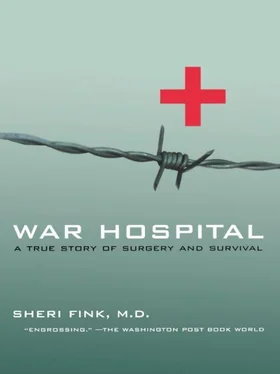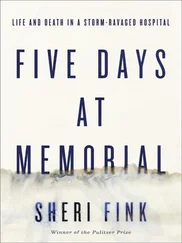On a related note, even strict adherence to the concept of humanitarian neutrality should not prevent international aid workers from assisting wounded combatants who are, by definition, hors de combat. So many aid groups, MSF included (as described in this book), shy from such activity, demanding that soldiers be kept out of the hospitals where the aid groups operate and focusing their efforts instead on the civilian victims of war. I have witnessed this on the ground in all of the war-torn regions I have visited—aid workers don’t want to touch soldiers. However, refusing to treat soldiers who have no other medical options is a breach of a fundamental medical tenet: Physicians must provide emergency care unless assured that others are willing and able to give such care (incidentally, by the same principle, Dutch military doctors were wrong to deny emergency care to Srebrenica civilians in July 1995, based on their military order to keep an “iron ration” for themselves; and any medical workers who went on strike, left, or otherwise refused to treat patients from Srebrenica could rightly do so only to the extent that there was someone else available to treat patients or—I would argue—in cases where their own safety would have been put at grave risk for doing so). It should not be forgotten that the Red Cross itself, the bastion of humanitarian neutrality, had its genesis with the wounded soldiers on the battlefields of Solferino.
On the other side, what is it worth to maintain one’s neutrality these days? Taking the example of Srebrenica, combatants, particularly Bosnian Serb forces (who fired on Srebrenica Hospital and the grounds of the 1993 medical evacuation, detained and killed patients and medical workers, and repeatedly denied access to humanitarian assistance) but also Srebrenica’s soldiers (who killed a Serb nurse in the war’s early days) and the Bosnian government (which included military supplies on helicopters bound for Srebrenica that were marked with a red cross—thus abrogating their neutral status and making them legitimate military targets) failed from the very beginning of the war to respect the neutrality and protected status of medical workers and medical objects.
This begs another question: How can doctors and humanitarians who are observing medical neutrality and humanitarian impartiality assure their own protection? From the first MSF workers to be injured in Vukovar, experiences in the former Yugoslavia throughout the 1990s have left many aid workers questioning how to go about assuring their own safety when respect for the Geneva Conventions can no longer be counted upon for their protection. Many humanitarians were and are unwilling to accept armed protection from militaries: Independence from military authorities is a fundamental concept of humanitarian work, and one over which MSF in Srebrenica was even willing to go on strike.
In the case of Bosnia, however, humanitarians, including Eric Dachy, wouldn’t have been able to function in places like Srebrenica without at times accepting military escorts. It was simply the only way for him to get access to the people who needed him and to perform his humanitarian work. The humanitarian-military cooperation and military involvement in humanitarian assistance that Eric and other aid workers first witnessed in northern Iraq in 1991 has only expanded since Bosnia; there are many examples, including Kosovo in 1999 and, in the post-9/11 world, Afghanistan. In the latter, it was feared that a blurring of the distinction between military and humanitarian actors was leading to the targeting of neutral aid workers. In the spring of 2003, the controversy reached its highest pitch in Iraq. Aid groups split over whether and how much to cooperate with coalition (U.S., Great Britain, Australia) military to gain access to populations in a highly insecure environment; whether to “boycott” a major funding source—the U.S. government—if the U.S. Department of Defense, rather than the U.S. State Department, maintained control of relief efforts; and whether to work at all in post-war Iraq, given the capability and legal responsibility of the “occupying powers” to assure adequate health service delivery.
In theory, traditional humanitarianism requires independence from governments and militaries (impartiality—providing aid based on need alone—is the fundamental precept of humanitarians, and adherence to the principles of independence and neutrality help to ensure it); in reality, most NGOs require government funding (inevitably meted out according to political priorities) to function and military intervention or protection to reach certain target populations. The humanitarian community, with its “classicist” versus its “political humanitarians,” still struggles with these contradictions. A search for other options is under way, from private funding of NGOs and the U.N.’s Central Emergency Trust Fund to the European Rapid Reaction Force and the creation of a capable U.N. intervention force. For now, the coexistence of orthodoxy and pragmatic reform related to humanitarian independence, neutrality, and speaking out about human rights violations allows some humanitarian organizations to operate more effectively in some situations, and others in other situations. The fact that the international order and the nature of conflicts have continued to change in the years since Srebrenica fell, with no let up in human suffering, shows that humanitarians must remain flexible and open to constant reexamination of their work in order to remain effective.
Finally, the shining example of a doctor who observed medical neutrality in this book was Boro Lazić, who repeatedly demonstrated his willingness to treat all who requested his assistance, regardless of their ethnicity, and never took part in the fighting. How ironic that he ended up serving the forces that committed the greatest act of genocide on European soil in fifty years.
There is a burgeoning idea among medical leaders and ethicists, such as the renowned Arthur Caplan of the University of Pennsylvania, that “medical neutrality is not enough.” It is a doctor’s special duty, as someone dedicated to healing and the preservation of health, to protest atrocities. By this principle, it would have been incumbent upon all of the doctors in this story to speak out and try to stop human rights violations being conducted by the military forces with whom they had contact. Of course, this would not have been an easy task. In the case of the Bosnian doctors—both Serb and Muslim—it could have put them in significant danger. So, too, with the Doctors Without Borders internationals, who had to balance condemning those authorities who violated human rights (like Radovan Karadžić) and working with them to gain access to people in need.
That tension—between carrying out their duties as doctors and humanitarians and ensuring their own safety and survival—was one that every health professional in this book was forced to face. Each of them, as a result of their individual personalities and belief systems, made different decisions about how to react to the war zone, when to practice medicine, when to refuse to do so, when to speak out about moral issues, when to keep silent, when to participate in military actions, when to enter dangerous areas, and when to leave their patients behind. A great deal can be learned from the dignity and humanity every one of them showed in the outrageous situations in which they found themselves.
It is my great, albeit unrealistic, hope that no doctors or nurses will ever again have to face such decisions.
* * *
YOU MAY BE INTERESTED in knowing the fates of the main characters and their reflections on the events described in this book.
— Dr. Boro Lazićopened his own psychiatry clinic in Belgrade, Serbia, the Special Hospital for Addiction Medicine, in March 2003. After returning home from the offensives on Srebrenica and Žepa, he tuned into Bosnian television and saw a hospital bedside interview with Sadik Ahmetović, learning that the medical technician he helped save was indeed alive. (Sadik later went on to become vice president of the Srebrenica municipal assembly in the Serb Republic, elected because thousands of displaced Srebrenicans voted for government representatives in absentia.) War followed Boro and Boro followed war. After the peace settlement in Bosnia, his sense of adventure and desire to earn money led him to enlist as a mercenary with Mobutu Sese Seko’s troops in Zaire. Seko’s regime was overthrown and Zaire became Congo. Boro returned to Bosnia, gave up on the idea of training in surgery, and moved to Belgrade, Serbia, to do a residency in psychiatry. There, he found himself caught in yet another war, NATO’s 1999 bombing of Serbia over Kosovo. He is hopeful that his war days are over.
Читать дальше












